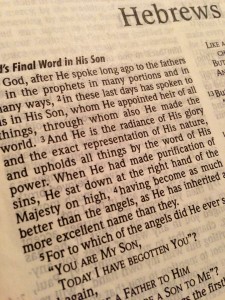 It is common for us as pastors to be telling the congregation what they ought to be doing. It is oftentimes less common for an explanation to be given as to HOW to do these things. One such area is the arena of prayer. We all know that we as Christians should be people of prayer, but what causes many to stumble is a lack of knowledge as to how exactly to go about the task.
It is common for us as pastors to be telling the congregation what they ought to be doing. It is oftentimes less common for an explanation to be given as to HOW to do these things. One such area is the arena of prayer. We all know that we as Christians should be people of prayer, but what causes many to stumble is a lack of knowledge as to how exactly to go about the task.
I was greatly impacted some time back when reading a written prayer made by Tim Challies, found on his blog (www.challies.com), in preparation for a conference he was due to attend. The thought came to me that if I adjusted just one or two words, and maybe added one or two things, the prayer would be a useful tool for all of us Christians as we prepare our hearts each week for a different setting; that of Sunday worship. Here then is that suggested sample prayer, based almost word for word on the one Tim wrote. I trust many will find it useful. – Pastor John Samson
“Our gracious God and Father. I approach Your throne today, knowing that it is only through the name of Jesus that I can stand before You. I thank and praise You for Your goodness in allowing me to do so. I recognize very well that I am unworthy of this honor, this privilege, apart from Your unmerited favor and grace. I come before You to seek Your blessing on the service on Sunday.
Grant that the Word will come to us with power and with great freedom. Be near to our Pastor and his family. Keep the family close as they serve You together. Protect them from dangers both seen and unseen. May our pastor know great wisdom as he plans his day and his week around the priorities You lay before him. May his schedule allow him much time to study Your word and to pray. May he know that he is serving You and all of us very well as he makes these a high priority. May our pastor’s family time also be protected. Grant that he would be free from all unnecessary busy-ness in ministry. Also grant our pastor sufficient rest and sleep.
Grant our pastor humility before Your Word as he finishes his preparations and grant that he may be filled with a holy dread and gravity as he stands before Your people. May he know what it is to be filled afresh with the Holy Spirit. May we truly know what it is to sit under the preaching of the Word. Speak to us, we pray. Speak to our hearts through the words we hear. May we never be the same.
Be with us in our worship. Be near to those who may sing or play instruments. Grant that in all things they may seek to serve You. May songs be selected that will bring glory and honor to Your name. May they lead us in singing songs that celebrate the beauty of the Savior and sing of Your wonders, Your glory, Your triumphs, Your holiness, Your majesty and Your great gospel. Let everything that has breath in that place praise the Lord together. May our worship be a sweet and fragrant offering to You. Accept it Lord, though we know it is poor and imperfect. Accept it through Your grace.
Be with the men and women who will be serving this week – those who are responsible for hospitality, greeting and ushering… Even now Lord, please fill all of these people afresh with Your Spirit. We thank you for the servant’s hearts You have given to them. I ask that You will allow them to be a blessing to many this week, even to those who do not yet know You. May the service run smoothly and may Your hand be evident in all that transpires. May Your love truly flow amongst us. May each of us be sensitive to the needs of others.
Bless our church’s outreach this week, through the words we speak, the love we show and the help we give to others. Bless the proclamation of Your gospel both by word and by life. In Your goodness, bring many to repentance. Direct our conversations, and help each of us to be bold in sharing the good news of Christ with others. Use me and all of our church in outreach this week I pray.
Would you help all who attend to come to the Sunday service as true worshippers–as those who worship You in spirit and in truth. Remind us that the gathering of Your people to worship is something You have ordained for us. It is a holy and sacred time. Help us to take the Lord’s day seriously. Prepare my heart and each of our hearts even now for what You will say to us then. Grant that we may not come before you as frauds, standing in Your presence filled with unconfessed sin. Give us the strength and wisdom to reconcile ourselves to our brothers and sisters before we come before You in worship. Give us discerning hearts that we may see and confess our sin before You. Open our eyes to see and to know You in a new way. Help us to worship You, not only with our lips, but with our hearts, our souls, and all that we are. Accept the gift of worship we will bring to You. May it please You.
Be with our pastor as he prepares to preach Your Word on Sunday. Grant that his time of preparation will be fruitful and that You will stir His heart with the great news of the gospel, of the precious truth of justification by grace alone through faith alone in Christ alone, all to the glory of God alone. May all of us at our Church live in the power of this gospel always. Protect us from the devil’s lies and help us to never be bored by the wonderful doctrines of grace, but grant that they may be the joy and delight of our hearts. Open our eyes Lord to see just how Your glorious gospel affects each and every area of our lives. Grant that our pastor or any guest minister may preach with great power and passion on Sunday morning. May the preaching be God-centered, cross-centered and gospel-centered.
Be with me Lord. Prepare my own heart for Sunday morning when You speak to us as Your people. I confess that already my heart is polluted with sin. As I think about worshiping You, already I wonder how other men may perceive me. Already I sin against you. Extend Your gracious forgiveness to me that I may come before You with a clean heart. Renew a right spirit within me. Keep the truth ever before me that to obey is better than sacrifice. Help me to be obedient to You in all things. Fill me with Your Spirit. Grant that I may serve You by serving others.
Grant traveling mercies as men and women, boys and girls come to our Church on Sunday. Keep us safe this week and as we gather together in Your name.
We pray for peace and unity while we gather together. We ask that there will be mercy and understanding. We ask that there will be a great outpouring of your Spirit. We ask that you will bless us for the sake of the glory of Your great name.
I ask these things humbly and in the name that is above all names, the Lord Jesus Christ. Grant that I may be expectant and observant in seeking answers to this prayer so that I may praise You for Your goodness.”

